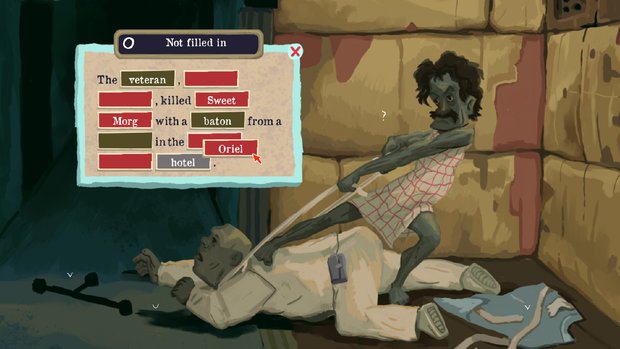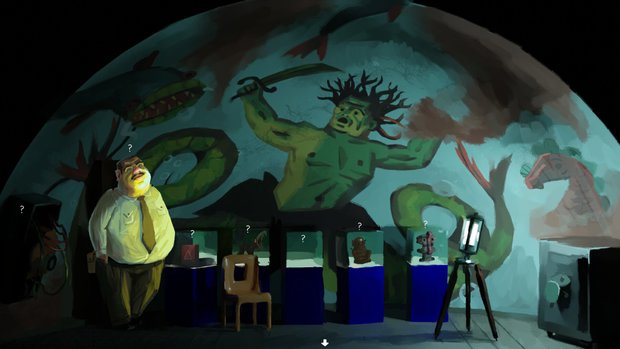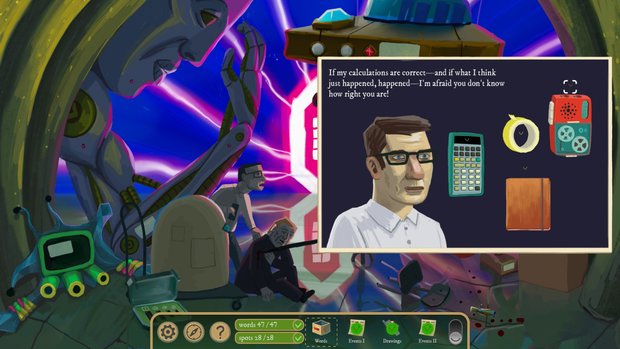The Rise of the Golden Idol review

- 1 Comment
Shining almost as brightly as its predecessor, the sequel provides many more inventively offbeat cases to solve with Mad Libs-style deduction
In 2022, a modern classic burst onto the scene in The Case of the Golden Idol. Developed by two brothers at Color Gray Games, it aimed to inject a healthy dose of genuine sleuthing into a genre largely absent of it and succeeded – big time. By reinterpreting bits of Lucas Pope’s Return of the Obra Dinn, chiefly its core mechanic of identifying murder victims based off of the subtlest of clues, Case still managed to be something entirely of its own: an eighteenth-century epic with fill-in-the-blank gameplay that was equal parts whodunnit, howdunnit and whydunnit (and occasionally whendunnit for good measure). Swiftly followed by a couple of cracking good expansions, the thoughtful deduction game tantalizingly set the stage for a whole new adventure game subgenre to flourish. Mixing observatory reasoning with a streamlined, extremely accessible gameplay design was a hit move, doing a tremendous job in letting players feel like the smartest versions of themselves. It was a glorious trailblazer, and I couldn’t get enough.
With the release of The Rise of the Golden Idol, my prayers have been answered: the indie darling has now become a bona fide franchise. And while the charms and originality of the first game may have captured my heart just a touch more, Color Gray didn’t just phone it in with a “safe” sequel here. This bold and risky follow-up honors its predecessor’s events as canon but jettisons much of the aesthetic and setting, trading its Age of Enlightenment intrigue for the trappings of a 1970s conspiracy thriller, with a healthy dose of sci-fi fantasy thrown in for good measure. Despite lacking some elements of the original that I dearly missed, I’ll be darned if The Rise of the Golden Idol wasn’t the most fun I’ve had playing a mystery game since… well, The Case of the Golden Idol!
For a sequel that tonally shakes things up, players familiar with the last game should still feel right at home with how this one works – although there’s been a couple tweaks to the interface I’ll get into shortly. You still play by observing offbeat crime scene tableaus from an omniscient viewpoint, where everyone present is frozen in an endless loop that replays the last few seconds of each scene’s key moment. You’re presented with just enough clues to catch a couple lines of dialogue from the rather suspicious characters around the scene, but the true context of what just occurred will only become clear with a deep dive of rifling through everyone’s pockets, reading over every letter and poster in the area, and often cross-referencing information discovered in previous chapters.

You don’t pick up items or solve traditional environmental puzzles in the Golden Idol mysteries. Instead, inspecting clues will add various words to an imagined “inventory” of sorts. Sometimes the words will be names (with first names and surnames always separated, for extra fun), sometimes they’re objects, and sometimes they’re verbs like “Steal” or “Push.” You’ll use these words to fill the gaps of unfinished case summaries on another screen, where almost all the names, nouns, and verbs are missing. By dragging and dropping the right words to the right blanks, the tangled web of bizarre actions and sinister motives at last comes into focus; then it’s onto the next scene to do it all again. Since you don’t play as an established character, you always passively observe the story as it happens – never affecting the outcome of events, but serving as an all-seeing voyeur that (eventually) understands everything.
The setting of Rise is a risk that thankfully paid off. As a major fan of the original game’s old-world European vibe, I was wary when the sequel announced its huge departure from that baseline. I had concerns that the more contemporary feel wouldn't have the same transportive, escapist effect this time around, but any such worries vanished in a flash, as the game quickly reminded me it wasn’t tethered to the confines of real history, real geography, or even real science. Just like in The Case of the Golden Idol, the mystery takes place in a fully made-up world, albeit one that’s suggestive of our own – with the original game’s setting of Albion (substituting for the real-world UK) making way for Rise’s densely packed metropolises of the Allied States of Hesperia. You can probably guess what it’s a stand-in for.
While it starts off as a somewhat grounded tale of corporate intrigue and cult-centric shenanigans, things quickly escalate with more and more outlandish elements until the world feels equal parts familiar and alien. The golden idol of the first game, still discussed in historical circles 200 years after being destroyed, is somehow back – but with a twist. And returning players who think they had the functions of the idol all sorted out last time will have to dust off their Lemurian history books and get prepared to relearn everything they thought they knew. On paper, there’s some ridiculously out-there concepts that make up the twists and turns of the crime spree that form this narrative, but I enthusiastically bought into them all without a second thought.

It doesn’t hurt that the writers tackle these wilder aspects of the story with gleeful aplomb. The main mystery takes place over a much shorter period than Case’s 40-year enigma, and doesn't quite reach the same epic heights. But what Rise lacks in decades-spanning scope, it more than makes up for it in sheer ingenuity of the individual scenarios, which deserve a standing ovation for the variety and creativity on display.
Case in point: one early conundrum involves a heist at a drive-in movie theater. Why on earth is there a heist here, of all places? Well, it’s a very special theater sporting some esoteric technology that verges on magic, and obtaining it is one part of the grand plan for some rather shady figures that, once again, want to reshape the world as they see fit. But to figure out how they’ve gone about this, you also need to familiarize yourself with the characters of the schlocky space movie that’s premiering that night, all so you can understand what’s going on inside the minds of the fans (cosplaying as their favorite characters for the costume contest), who hold clues to who the baddie is and all got caught in the pandemonium. And this part is pretty standard stuff by The Rise of the Golden Idol’s metric.
Inventive cases have always formed the identity of this series, but here the imagination is bursting out of the screen to give us a generous handful of mysteries that are among the best yet. The plethora of unorthodox, bite-sized sequences in Rise will keep you busy for an easy 12 to 15 hours, including an antiquity auction where you’ll deduce who’s trying to bid on each arcane lot, an aviary in turmoil filled with menacing fictional bird species, a deceptively deep case that has you learning the routines of an entire apartment complex’s residents, and a catastrophic talent show where most of the competitors are sabotaging each other in creative, underhanded ways.
Some cases aren't as memorable as others but still play an important role in the overarching plot, no matter how loose that link may initially seem. By the end of the saga, when the full extent of all the schemes of the various parties became clear, I couldn’t help but marvel at all the deft and multilayered setups and payoffs. It’s surprisingly fun to revisit earlier scenes after finishing the whole game to appreciate those events in a brand new context, giving you many chances for “a-has!” even after the credits roll.

The one and only area that I thought Rise stumbles just a little is within the new interface. In the original game there were two modes: Exploring and Thinking. While “Exploring,” you were allowed to pore over the scene of the crime and inspect clues for words to add to your inventory, while “Thinking” filled the screen with various panels to lay out the case’s logic and identify everyone present. In both modes, your accumulated words were always visible at the bottom of the screen.
In Rise, the panels that previously would have all been grouped together on the Thinking screen have instead been divvied up into individual sections that can be toggled on and off at will during your investigation, overlaying small deduction screens on top of your environment. One button opens a panel that identifies the people in the scene, another button, labeled Events, shows the panel needed to solve the current case, and often there’s an additional panel (or two) that contain additional “mini mysteries” within the scene, like learning whose luggage belongs to who, or listing the chronological order of how an event unfolded. Frequently there are also additional panels that relate to a multi-case arc, though these can’t be solved until the last case of each of the five main chapters (housing three to four cases each).
In theory, this level of flexibility allows you to focus only on what you want to solve at any given time. In practice, it can be a bit of a chaotic mess. Even as I slowly got more comfortable with the interface as the game advanced, it never became second nature by the end. Panels can be stacked on top of each other, which can also stack on top of in-game pop-out screens that appear when you click on certain hotspots, all leading to minor visual confusion that the original game never suffered from. It's not too much of a hassle to navigate, but I did find myself fighting with the interface at least once per case. When the first game's presentation was so elegant, it stands out to have the interface take any step backward, even if it's just a slight one.
Visually, Rise retains some similar art direction from Case, with characters still featuring the signature exaggerated, slightly grotesque design. However, the old-school pixel art look from Case has been replaced with a much more modern painterly style that hides any trace of blockiness, bolstered by very smooth animation. It’s different for sure, but serves the change of setting rather well. The musical score (by new composer Paul Alexander) is atmospheric and never calls attention to itself, making great use of the new setting to build a soundscape evocative of an off-kilter police procedural, with twangy guitars and moody backing synths that give everything the slightly askew vibe that fits so appropriately.
Unlike the body count of Case, there’s actually not a whole lot of murders in Rise. A good number of deaths and much of the bodily harm here are more accidental than intended, and most of the cases don’t involve anyone dying at all, focusing instead on the motivations behind assorted thefts, fraud, prison breaks, brainwashing, and unchecked corporate greed. This is a small step away from the Obra Dinn inspiration (which was “all murder, all the time!”) and opens things up for much more variety, even if the actual deductive gameplay is largely unchanged. Some cases go as dark as the series has ever gotten, while others are whimsical and frankly hilarious. It’s a good balance that prevents things from falling into too strict of a formula, and I was all for it.
And for players who flock to the deductive genre in search of a worthy challenge, oh boy. The game does a really good job of dangling loads of plausible red herrings to influence your theories and throw you off track. Sometimes it's maybe even too good at coming up with ways to trick you – and because you’re required to complete quite a few sentences on the deduction panels that all must be simultaneously correct to progress, it can be very tricky to sleuth out which sentences you got right, and which sentences got you fooled with their devious tricks. For the most part, the difficulty is roughly comparable to The Case of the Golden Idol, with several scenes being just a touch on the easier side. Considering the first game was one of the most finely tuned challenges I’ve ever faced, that’s pretty high praise. That said, there were a couple moments in Rise that went the other direction, where I was so stumped that I simply couldn’t resist the allure of the in-game hint system – which is simplified this time around, requiring players to merely wait for a short breathing ritual to conclude, rather than complete Case’s tedious matching game to get help.
Final Verdict
By the end of the game, after unwinding the logic of so many off-the-wall crimes and unfortunate accidents – and bouncing back and forth into past scenes to test my theories on how it all tied together – I was fully caught up in the ride. The conclusion was a fittingly wild, humorous, and also melancholy doozy that will stick with me for a while, capping off one of the best whirlwind mystery tales I’ve had the pleasure of playing through in many years. For every theory that reached a dead end, there’d be an "oh MAN, that's crazy!" moment to take its place and keep the momentum racing forward. And even though it may not quite reach the hard-to-beat heights of the original game's sprawling mystery (but only barely), it’s a wonderful sequel that proves Color Gray Games has some of the deduction game scene’s greatest talent of our time. I’m thrilled to check out whatever they create next, and we won’t have to wait long with the exciting promise of a whopping four additional DLC packs scheduled to arrive soon. You can probably fill in this blank: The Rise of the Golden Idol is one of my ______ games of the year.
Hot take
Full of intriguing setups and wickedly good payoffs, The Rise of the Golden Idol is more of the same winning deduction formula but with a fresh spin that shakes up the foundation enough to feel strikingly original once again.
Pros
- Wonderfully inventive scenarios are a joy to solve
- Grand, fascinating overarching plot
- Difficulty level feels challenging but fair
- Outstanding artistry across the board
Cons
- Occasionally the challenge gets a little obtuse
- Interface not as elegant as the original game’s
Sean played his own copy of The Rise of the Golden Idol on PC.











1 Comment
Want to join the discussion? Leave a comment as guest, sign in or register in our forums.
The devs were aware that some people preferred the old thinking panel. Thanks to the "scaling" option you can rearrange the panels to fit in one screen. So you create your very own thinking panel, which you turn on and off with the eye button on the right. It worked fine for me. Of course you have to do this for each case, but I didn't mind. It actually added to the fun.
Reply
Leave a comment